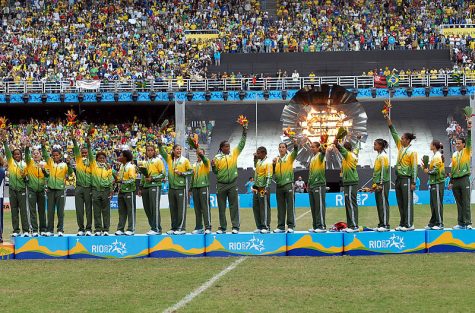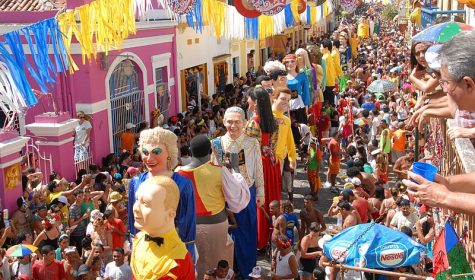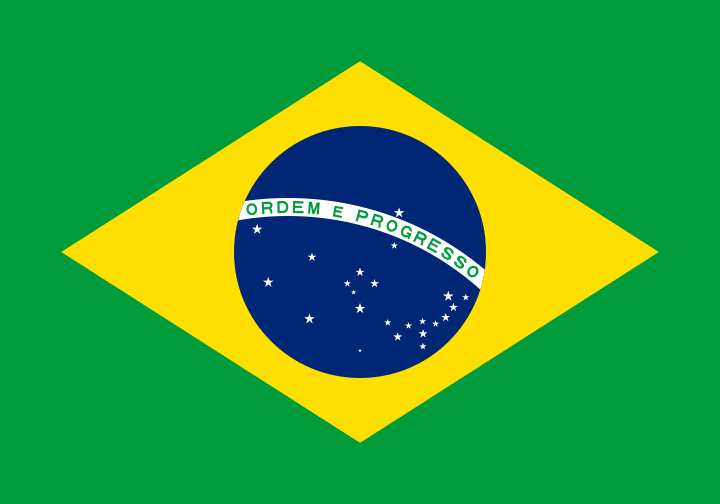Información de Brazil
Brazil is one of the most popular and largest countries in both South America and Latin America.
See page for author, Public domain, via Wikimedia Commons
Brazil’s flag was officially adopted in 1889. There are a total of 27 stars for the 26 states and capital, Brasilia. The phrase, “ORDEM E PROGRESSO” is Portuguese for “Order and Progress”.
When you look at a map of South America, you can’t help but notice the country that takes up most of the east coast. Brazil, the largest country in South America and fifth largest in the world, was established when Prince Dom Pedro declared independence from Portugal in 1882. In 2020, it was home to an estimated 212, 559, 417 people according to UN data. With 80% of the population living in cities and towns, this nation is one of the most urbanized and industrialized countries in Latin America.

Brazil is considered a tropical paradise for its location, exports, music, and sports. Since it lies in the Southern Hemisphere, seasons are the exact opposite of what American citizens are used to. Summer is from December through March and Winter lasts from June to September. The top exports of Brazil are Soybeans, Crude Petroleum, and Iron Ore to China, the US, and Argentina. The top imports are Refined Petroleum, Vehicle Parts, and Pesticides mostly from China, the US, and Germany.
Brazil is home to around 60% of the Amazon Rainforest which accounts for 1/10 of all species in the world. Therefore, Brazil is considered to have the greatest biodiversity of any country on the planet.
Music is a vital part of everyday life because of its cultural richness. Football (soccer) is the nation’s most popular sport with citizens of all ages and skill levels participating year round. As a result, Brazilian teams are consistently the top contenders during the World Cup every four years. The second most popular sport is volleyball.
Society in Brazil is conservative yet free-spirited with a variety of cultures and languages. The different cultures of the indigenous Indians, Africans, and Portuguese have together formed the modern Brazilian way of life. The Portuguese culture is the most dominant of these influences and Brazilians have acquired their language, religion, and traditional customs from it. Brazilians are known for their love of dance and music with regular celebrations taking place.

Carnival is the most famous Brazilian holiday. The Carnival de Rio de Janeiro is celebrated for five days after Ash Wednesday, which is the start of Lent in the Catholic calendar. At the heart of the celebration is the samba, which is a good representation of the Afro-European blend that defines Brazilian culture. Carnival parades take place in Rio de Janeiro and Sao Paulo from morning to late in the night. Ever since 1723, the Carnival in Rio de Janeiro has been a festive and significant tradition in Brazilian culture.
Social media plays an important role in these citizen’s lives. According to Statistia, Facebook concentrated more than half of all social visits in 2020, with Pinterest and Twitter close behind. Along with social media, citizens receive their daily news through corporate news outlets (Globo, TV Band, Sistema Brasileiro de Televisao) and newspapers (Valor Economico, Folha de S. Paulo).
Similar to the United States, Brazil has a democratic government that consists of an executive, legislative, and judicial branch. The legislative branch consists of a Federal Senate with 81 members and a Chamber of Deputies with 513 members. In the Judicial branch, each judge is elected by tribunal members and their term is life-long. The executive branch houses the President and their term is 4 years. Brazil is made up of 26 states with 5,500 municipalities that are each run by a mayor. The voting age is 18-69, but anyone aged 16, 17, or over 69 has the option to vote.
It’s no secret that Brazil is on many people’s bucket lists. With its diversity of plants, animals, sports, and cultures it has something to offer for anyone who steps foot in its beautiful country.



